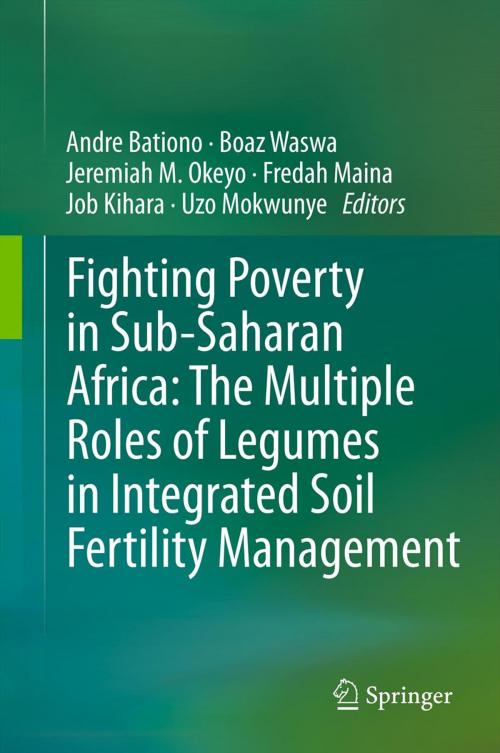Fighting Poverty in Sub-Saharan Africa: The Multiple Roles of Legumes in Integrated Soil Fertility Management
Nonfiction, Science & Nature, Technology, Agriculture & Animal Husbandry| Author: | ISBN: | 9789400715363 | |
| Publisher: | Springer Netherlands | Publication: | August 24, 2011 |
| Imprint: | Springer | Language: | English |
| Author: | |
| ISBN: | 9789400715363 |
| Publisher: | Springer Netherlands |
| Publication: | August 24, 2011 |
| Imprint: | Springer |
| Language: | English |
Legumes play an important role in the cropping systems of sub Saharan Africa (SSA). Legumes are an important source of nutrition to both humans and livestock by providing the much needed protein, minerals, fibre and vitamins. The sale of legumes seed, leaves and fibre generates income for the marginalized communities especially women. Cultivation of legumes is essential for the regeneration of nutrient-deficient soils. By biologically fixing nitrogen (BNF) in the soil, legumes provide a relatively low-cost method of replacing otherwise expensive inorganic nitrogen in the soil. This enhances soil fertility and boosts subsequent cereal crop yields. Production of legumes in SSA is however; hampered by a number of constraints among them low and declining soil fertility, low soil pH, high salinity, drought and flooding, poor access to improved germplasm, diseases, pests and weeds. Farmers need to learn how to overcome these constraints if the full benefits of legumes are to be gained. This book presents a synthesis of research work on legumes and draws attention to the importance of legumes in integrated soil fertility management (ISFM) and poverty alleviation in SSA.
Legumes play an important role in the cropping systems of sub Saharan Africa (SSA). Legumes are an important source of nutrition to both humans and livestock by providing the much needed protein, minerals, fibre and vitamins. The sale of legumes seed, leaves and fibre generates income for the marginalized communities especially women. Cultivation of legumes is essential for the regeneration of nutrient-deficient soils. By biologically fixing nitrogen (BNF) in the soil, legumes provide a relatively low-cost method of replacing otherwise expensive inorganic nitrogen in the soil. This enhances soil fertility and boosts subsequent cereal crop yields. Production of legumes in SSA is however; hampered by a number of constraints among them low and declining soil fertility, low soil pH, high salinity, drought and flooding, poor access to improved germplasm, diseases, pests and weeds. Farmers need to learn how to overcome these constraints if the full benefits of legumes are to be gained. This book presents a synthesis of research work on legumes and draws attention to the importance of legumes in integrated soil fertility management (ISFM) and poverty alleviation in SSA.















